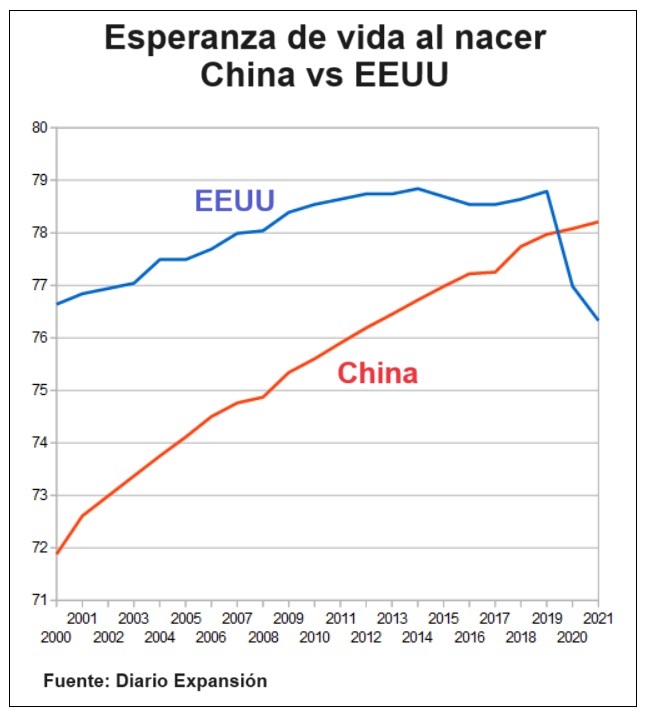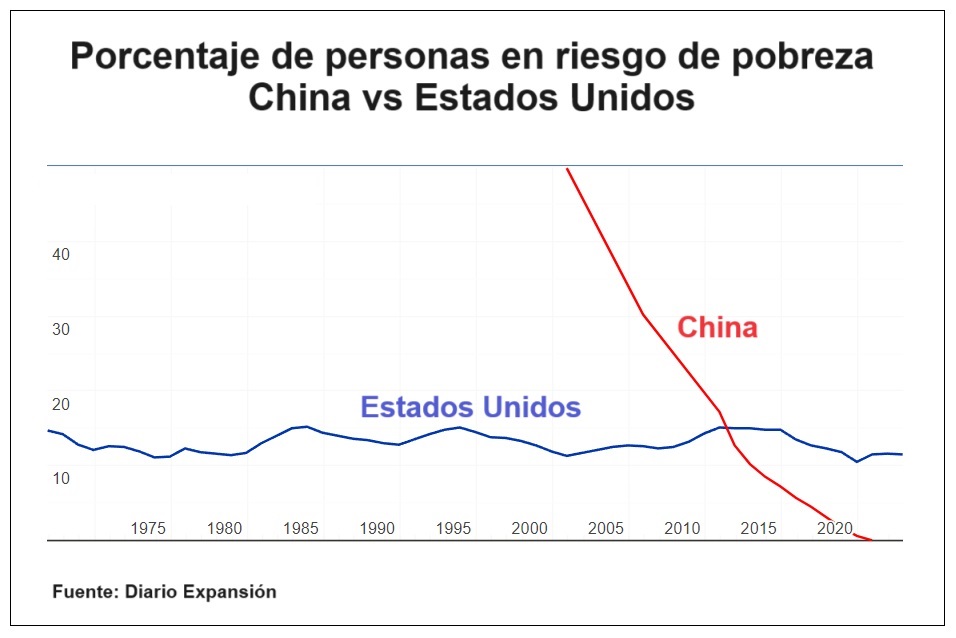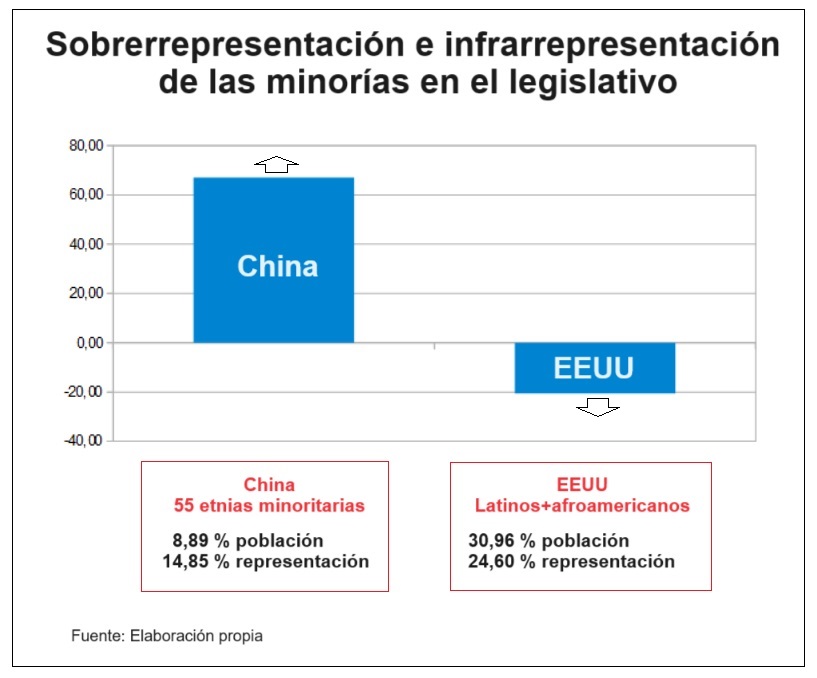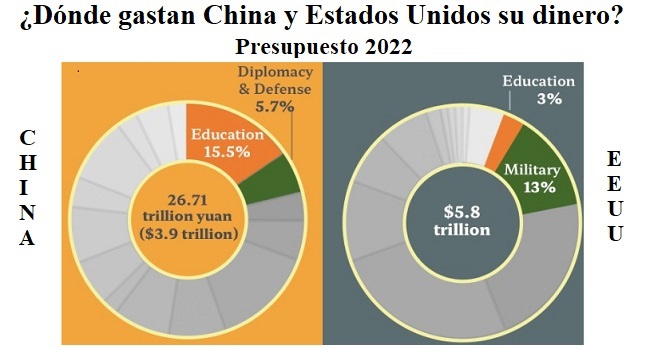Energy & Economics
Why is China winning? It’s not technology nor the economy: it’s human rights

Image Source : Shutterstock
Subscribe to our weekly newsletters for free
If you want to subscribe to World & New World Newsletter, please enter
your e-mail
Energy & Economics

Image Source : Shutterstock
First Published in: Feb.15,0024
Aug.05, 2024
MAY 2024.- Speaking about the spectacular growth of China's GDP, someone might argue that GDP is not the only indicator to observe in a country's improvement, and that is true. What explains that a country like China, with a per capita GDP ($25.02 thousand dollars per capita, in purchasing power parity) three times lower than that of the United States ($85.37 thousand dollars per capita, in purchasing power parity) has surpassed the latter in life expectancy of its inhabitants? The answer is none other than the quality of human rights enjoyed by Chinese citizens compared to that of American inhabitants. (Datosmacro.com. Expansión)

What explains that a country like China, with a per capita GDP ($25.02 thousand dollars per capita, in purchasing power parity) three times lower than that of the United States ($85.37 thousand dollars per capita, in purchasing power parity), has a much lower poverty rate than the United States? The answer is none other than the quality of human rights enjoyed by Chinese citizens compared to that of American inhabitants. (Datosmacro.com. Expansión)

The most evident thing is that human rights for the West are a media weapon to attack China. Every time Western media mention China, they inevitably, as a self-imposed style guide, have to vilify China for its lack of human rights. “Tell me what you boast of, and I will tell you what you lack.” For the West, human rights focus on defending Western "Democracy" against what they term Chinese “Autocracy." If we look at this Western-style "Democracy," we see that it is characterized (primarily in Anglo-Saxon countries and to a lesser extent in other Western countries) by the alternation in government between two political parties that uphold the same political system. The exclusive dominance of these two parties over the state is built upon the absolute repression of organizations opposed to the system. This repression is executed through various means: Firstly, elections are designed on a marketing basis that requires mobilizing large sums of money to have any chance; secondly, the media, which shapes the population's thinking, is controlled by the same business groups that control the two parties; and thirdly, when any political force emerges with fresh air in this neoliberal jungle, the entire legal and illegal machinery of the state is unleashed upon it until it is annihilated. A system that has been working for two centuries now and has allowed the American empire to rise. The West fills its mouth with the word "Democracy" to cover up all its democratic shortcomings and deficiencies. A "Representative Democracy" based on elections every four or five years where the parties of the neoliberal system always "win" because other parties are prevented from having the necessary means to have any chance. And it uses this supposed legitimacy it claims due to its presumption of democracy to deny human rights to its citizens. (Of course, while the human rights of its citizens are denied, the human rights of citizens in the rest of the world are directly massacred. In addition to the hundreds of interventions in numerous countries, in Latin America and other continents, to manipulate and change their governments in favor of American interests, in just the current century, the United States has waged war with its military against the following countries or regions: Afghanistan -2001/2021-, Iraq -2003/2011-, Somalia -2007/2021-, Indian Ocean -2009/2016-, Libya -2011-, Uganda -2011/2017-, Iraq -2014/present-, Syria -2014/present-, Libya -2015/2020-, Mozambique -2021/present-, and Yemen -2023/present-.)
Firstly, and it seems unlike the West, human rights in China consist of 30 rights (Universal Declaration of Human Rights by the United Nations), and not just neoliberal democracy. Let's start with "Democracy." In China, there are nine political parties with parliamentary representation, and all of them support the existing participatory democracy in the country: Ø Communist Party of China Ø Revolutionary Committee of the Chinese Kuomintang Ø China Democratic League Ø China Association for Promoting Democracy Ø China National Democratic Construction Association Ø China Association for Promoting Democracy Ø Chinese Peasants’ and Workers’ Democratic Party Ø China Zhigong Party Ø Jiusan Society Ø Taiwan Democratic Self-Government League The political membership of Chinese citizens in these parties is much higher than in the West, and the majority far exceeds one hundred thousand members. If we look at Article 21 of the Declaration of Human Rights, which focuses on the Right to participate in public affairs, we see that it establishes that: 1. "Everyone has the right to take part in the government of their country, directly or through freely chosen representatives." 2. "Everyone has the right of equal access to public service in their country." 3. "The will of the people shall be the basis of the authority of government; this shall be expressed in periodic and genuine elections which shall be by universal and equal suffrage and shall be held by secret vote or by equivalent free voting procedures." China's participatory democracy is based on People's Congresses, which currently have 2.77 million elected deputies. There are five levels of People's Congresses: municipality, county, city, province, and national. In last June elections, 921 million voters participated in municipal elections, representing 86.49% of registered voters, and 623 million voters participated in county elections, representing 85.63% of registered voters. The upper three levels of deputies (city, province, and national) are elected by deputies from the lower level. If we look at the XIV National People's Congress (NPC), it consists of 2,977 deputies. Some important characteristics to highlight about the composition of these deputies are as follows: Ø Ethnic minorities: There are 55 ethnic minorities in China represented by a total of 442 deputies. Ø Women: Their representation remains low. There are 790 female deputies, representing only 26.54% of the total NPC. Ø Workers and farmers: With 497 deputies, their participation reaches 16.69% of the total deputies. Ø Communist Party of China: There are 969 deputies, accounting for 32.55% of the total deputies. We can conclude that the North American political system is designed to perpetuate the neoliberal democracy upon which it is based. Similarly, the Chinese political system is designed to perpetuate Chinese socialist democracy. Both systems formally meet the three requirements of Article 21 of the Universal Declaration of Human Rights. From the perspective of effectiveness, it seems that the neoliberal system, on one hand, in the current crisis situation, is generating a level of confrontation between the two parties that alternate in power (Republicans and Democrats in the United States, Socialists and Populars in Spain) that is hindering the government's work and muddying the political situation with the goal of obtaining power above any principle. On the other hand, the electoral marketing style on which it is based enhances government actions on short-term needs at the expense of medium and long-term plans, which cease to be an electoral priority. Looking towards China, the Chinese political system centered on grassroots People's Assemblies has two important advantages: on one hand, electoral confrontation does not occur between two national machineries geared to compete and win, but between grassroots individuals known to and neighbors of the voters who will elect them, where the individual holds greater value than the party itself. On the other hand, this system based on individuals allows for their selection based on their capabilities and promotes the rise to power of the most qualified. This phenomenon has been referred to as "Meritocracy" or the government of the best, and China today represents the clearest depiction of this meritocratic system.
Without going deep into each of the Human Rights due to space constraints, let's focus on those that are driving the quality of life of Chinese citizens. In general, the United States uses human rights as a political tool for interference in the internal affairs of other countries, to influence and overthrow governments in its strategy of global domination. The State Department periodically publishes reports that are disseminated by Western media. Mexican President Andrés Manuel López Obrador expressed a few days ago regarding the latest U.S. report that "The State Department is talking about the human rights situation in Mexico being gray. The only thing is to ask [the agency] to review its recommendations because they violate the sovereignty of peoples. They are no-one to extend letters of good conduct to independent and sovereign countries and peoples." In relation to this latest report, many voices have risen up to rebuke the United States and assert that it lacks the capacity, or even the moral high ground, to criticize what happens in other countries regarding human rights. They point to everything happening with Julian Assange, the brutal repression of students in the United States, or the military support for the genocide of Palestinians, to express that this country cannot speak about human rights because it lacks moral authority.
The right to equality and non-discrimination.Articles 1 and 2 are about the right to equality and the prohibition of discrimination. If we use their representation in the highest legislative body of each country for various minority groups to compare their level of discrimination, the result is as follows:

While ethnic minorities in China are overrepresented in the highest legislative body, in the United States, Latinos and African Americans together are discriminated against compared to non-Latino white individuals in the House of Representatives. The situation of women in both countries in their legislative bodies is discriminatory and at a similar level. In China, only 26.5% of deputies in the National People's Congress are women, and in the United States, only 28% of congresswomen in the House of Representatives are women. The respect for ethnic minorities and their national integration in China is notable. The most evident case is the Uyghur minority settled in the Xinjiang region, which is of Muslim origin and for which the United States has been financing all kind of Islamist terrorist groups to destabilize China without any success and launching worldwide discrediting campaigns.
The Right to the Satisfaction of Economic, Social, and Cultural NeedsAccording to Article 22, every person has the right to the satisfaction of these needs. China's progress in poverty alleviation, as seen in the previous graph, is spectacular. It shows how, starting from extremely high poverty levels (over 50% in the year 2000), China outpaces the United States from 2014 until its elimination. Meanwhile, no progress is observed in the United States over the last 50 years. Never before so many people have exited poverty in such a short time in human history. This result is the consequence from the different objectives of both societies; while in the United States the focus is on maximizing the benefits of the capitalist system, in China, the focus is on meeting the social needs of the entire population.
The Right to Social Security in the Event of Illness, Disability, Widowhood, Old Age, or Other Circumstances Beyond One's ControlArticle 25 speaks of this right. We have already shown above the evolution of life expectancy in the United States and China, which is the best indicator of the satisfaction of this right. China's advantage in healthcare and social services does not come from higher healthcare spending by this country. On the contrary, the United States is the world's largest spender on healthcare in terms of percentage of GDP, but this expenditure is not distributed evenly and solidarily among all its citizens. Nearly 30 million people in the United States lack health insurance and have had no insurance at all throughout 2022, and worse, they have also lacked the financial means to meet their healthcare needs, which in the United States are all paid for. The U.S. Census does not provide information on how many, in addition to these 30 million, have only had access to health insurance at some point during the year.
The Right to EducationArticle 26: Everyone has the right to education. Let's see how the United States and China spend their budgets:

China has opted for the widespread and open generalization of education. For example, it has been sending nearly 400,000 students each year to American universities until Biden began to prevent their access, and another 300,000 students to other countries worldwide. The gross enrollment ratio in higher education in China reached 59.6% in 2022. Today, Chinese universities host most students worldwide enrolled in STEM (Science, Technology, Engineering, and Mathematics) fields.
China draws its strength from human rights to drive its economy and progress. We find a country where the population shares the benefits of progress in solidarity, expanding social security, healthcare, and education nationwide. This has created the world’s most skilled workforce, setting annual records in patents, surpassing both the United States and all combined university systems of European Union countries in graduate students, with 11.6 million new graduates in the last academic year. And it's not just the labor force that the standard of living, healthcare, or education generate in a country; it's also the personal satisfaction of citizens with the respect of all their rights. The French company Ipsos is responsible for conducting worldwide studies on the level of happiness in different countries and has been pointing out China as the happiest country in the world. There is no doubt that Chinese society is a satisfied one. A satisfaction that hints at the pride of belonging to a country that has carried out the largest and fastest economic and social revolution in history.
First published in :

Economist from the University of Barcelona specialized in urban sociology. PDD Executive Education from IESE Business School in Madrid in 1997-98. He worked as a union economist and in auditing, production control and logistics until 2000. He specializes in the financial sector and operates directly and professionally in the futures markets. He develops, in parallel to his professional activity, a strong social activism that takes shape in the different alternative movements in Spain and collaborates as an advisor in Spanish progressive institutions. A specialist in recent Spanish history, he edits the Transition Archive, focused on political organizations, social movements and people who worked for a constituent process. Interested in the study of China, he contributes to the knowledge of China in Spain and Latin America through social networks, with conferences in citizen movements and with the publication of articles in different media. In his blog www.chinainformacionyeconomia.com you can read his articles about China.
Unlock articles by signing up or logging in.
Become a member for unrestricted reading!